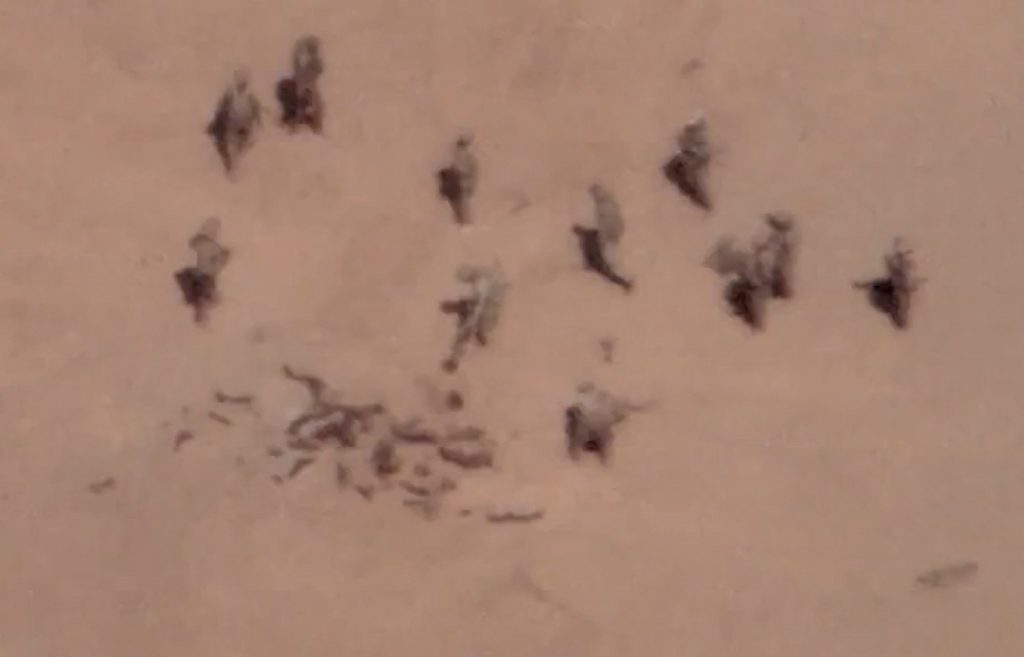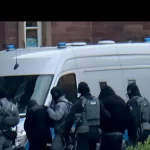Russia is destabilizing French society, turning it against the government and seeking the overthrow of President Emmanuel Macron. This objective is driven by France’s role in Europe and Africa, where it acts as a constraint on the Kremlin’s imperial ambitions.

More on this story: Russia intensifies subversive activity against France

More on this story: Kremlin to elbow Paris out of Africa, raising risks for France

More on this story: Russia seeking to meddle in presidential vote in France
France is one of the EU’s and NATO’s central powers: nuclear-armed, UN Security Council permanent member, and a diplomatic heavyweight. Undermining French stability weakens the EU’s collective response to Russia and reduces NATO’s unity, especially on Ukraine and sanctions. Despite past attempts at dialogue with Moscow, Macron has hardened his stance since 2022, providing military support to Kyiv (including long-range missiles and armored vehicles). Russia sees French leadership as a threat to its strategic goals in Ukraine and wants to erode domestic support for pro-Ukraine policies. France is a competitor in Africa, where Russia (via Wagner/“Africa Corps”) pushes for influence in Mali, CAR, Niger, and Sudan.
- Weakening Paris at home reduces its ability to project power in Africa, where Moscow is trying to dominate resource contracts and political alignments. The Kremlin claims leadership in Africa, presenting itself as the force that liberated the region from colonial dependence, while in reality pursuing its own neo-colonial policy on the continent. France is an icon of liberal democracy and Western culture. Destabilizing Paris has symbolic impact far beyond Europe, projecting Russia’s ability to disrupt Western core states.


- C The KGB ran long-standing operations in France, exploiting the French Communist Party, trade unions, and intellectual circles. The infrastructure of influence has not fully disappeared; Moscow continues to build on those networks.
- Gilets Jaunes Precedent: In 2018–2019, Russian media (RT, Sputnik) amplified Yellow Vest protests, portraying them as evidence of Western collapse. This experience shaped Kremlin doctrine on exploiting French unrest.
- Targeting of Macron: In 2017, Russian hackers linked to GRU (APT28/Fancy Bear) attacked Macron’s campaign (the “MacronLeaks” operation), showing Russia’s intent to disrupt French politics even before the Ukraine war.
- Amplification of protest movements (Yellow Vests, Bloquons Tout) through Russian state media, Telegram, and bot networks.
- Narratives often emphasize France’s decline, chaos, and hypocrisy on foreign policy.
Symbolic destabilization (desecrations, staged provocations, fake terror threats) to inflame divisions — especially along religious or social lines. Recruitment of fringe activists (far-right, far-left, sovereigntists, conspiracy groups) as vectors of influence. France regularly expels Russian diplomats accused of being intelligence officers. GRU and SVR prioritize political penetration of ministries, think-tanks, and defense industries.
- HUMINT efforts focus on cultivating French political figures sympathetic to Moscow’s positions (both far-right and far-left).
- The Kremlin cyber attacks on ministries, critical infrastructure, and disinformation campaigns through hacked leaks (e.g. MacronLeaks) with Goals to sow distrust, erode confidence in government institutions, complicate defense cooperation with allies.
- Russia seeks to divide European resolve, especially in France, which is delivering high-value weapons to Ukraine. France’s political fragmentation creates openings for Moscow to support anti-establishment forces. Inflation, austerity, and budget cuts make French society more receptive to narratives of decline and betrayal.
- With France retreating from Mali and Niger, Moscow sees a chance to consolidate influence if Paris is distracted by unrest at home. Russian intelligence is not simply opportunistic in France — it has long-term strategic goals: to weaken France’s global role, undermine EU unity, and erode NATO’s credibility. Current unrest (e.g. Bloquons Tout) provides fertile ground for low-cost, high-impact hybrid operations: online amplification, symbolic provocations, and support for extremist splinter groups. In October 2019, we analyzed a Russian military intelligence operation in Spain aimed at blocking transport communications. At the time, we noted that it was being carried out as preparation and planning for future sabotage. There is a high probability that, six years later, the Spanish case of Russian military intelligence will be applied in France, combined with the experience of supporting the Yellow Vest protests.

More on this story: Russia tested an ability to block transport infrastructure by hybrid instruments
Bloquons Tout is a decentralized social movement in France that called for large-scale protest actions (blockades, strikes, demonstrations) on 10 September 2025, in opposition to austerity measures, cuts to public spending, and political instability under Prime Minister François Bayrou. It has wide support from various parts of French society, including left-wing parties and trade unions, though its origin is partly from social media/social network activism rather than established institutions
French authorities and media have noted that foreign actors are amplifying the movement’s calls — particularly online — but there is no confirmed evidence that Russia (or any foreign government) has operational control over or is materially directing the movement
Key risk factors include further escalation (e.g. sabotage, infrastructure blockades, violence), political fallout for President Macron, and deepening public discontent over cost of living, public services, and trust in institutions. The government’s response (policing, budget modifications, concessions or crackdown) will likely shape how durable the protests become.
“Bloquons Tout” emerged via social media in mid-2025 (May-July), initially within circles critical of European institutions (souverainistes), along conspiracy-leaning and online activism groups
- The immediate trigger was the Bayrou government’s proposed 2026 budget: planned cuts (≈ €43.8 billion), removal of two public holidays (8 May and Easter Monday), frozen pensions, and general austerity in public spending.
- The movement claims to be non-partisan, horizontally organized (no central leadership), drawing from both disgruntled citizens and from political left parties and unions over time
On 10 September 2025, protests took place all over France. Estimates differ: government ~175,000 participants, trade unions up to ~250,000
- Actions included blockades (roads, transport), demonstrations, rallies, sometimes clashes with police and partial disruptions. Arrests and police deployment have been large (tens of thousands of security personnel mobilized
Broader dissatisfaction with price of living, inequality, weakening trust in institutions. Comparisons drawn with the Yellow Vest (Gilets Jaunes) movement of 2018.
Evidence & Claims of Foreign / Russian Links
| Claim | Evidence Supporting | Evidence Against / Gaps | Assessment & Confidence |
| Foreign actors (including Russian) are amplifyingprotests via online platforms | French intelligence and media report that pro-Russian and pro-Iranian accounts have promoted protest-related hashtags. RFI highlights “foreign actors amplifying calls to ‘Block Everything’ | No clear proof that foreign actors are directing strategy, providing funding, or controlling key nodes. Moderators of protest-Telegram channels say pro-Kremlin content is “moderated or criticized.” | Moderate: amplification likely, operational control unlikely based on currently available info. |
| Signs of “foreign interference” through symbolic acts (e.g. pig carcasses, provocative desecrations) | The discovery of pigs’ heads near mosques with Macron’s name has raised alarm; French authorities suggest similarity to past suspected foreign interference acts. Media reports note “possible hallmarks” of attempts to sow discord | Investigations are ongoing; no verifiable chain yet that connects these acts to Russian intelligence or funding. Could be domestic extremists. | Low to moderate: risky signal, but not yet evidence of Kremlin orchestration. |
| Foreign intelligence services (Russia’s GRU / Kremlin) might see opportunityin the unrest to weaken French political stability | Historical record: France has accused Russian intelligence of cyber-attacks, disinformation in past years. Experts warn that instability is a vulnerability that foreign adversaries often try to exploit. | But no published proof (as of now) that Bloquons Tout is part of or headed by such Russian intelligence ops. Most of the content seems domestically | Tentative: plausible interest, but no concrete proof. |
- If protesters move toward sabotage or more disruptive blockades (transport, energy infrastructure), risk of both violent clashes and infrastructure damage increases. The state response may escalate accordingly.
- Different ideological groups (far left, far right, populists) may attempt to insert themselves, which could increase risk of internal infiltration or extremist participation. Government may be forced into concessions, re-working the budget, slowing austerity, or even triggering early elections. Also, protests may erode Macron’s legitimacy further.
- : Amplification of protest content via foreign media or social platforms could distort narratives, inflame social divisions, or encourage extremist offshoots.
- Monitor online platforms rigorously for foreign amplification and disinformation, particularly around hashtags and narratives that echo Kremlin propaganda lines.
- Strengthen public communication: Provide transparent info about economic policies, austerity, public spending, rationale to reduce space for narrative distortion.
- Pre-empt escalation: Keep emergency services and security forces ready for risk points (transport hubs, energy infrastructure), but balance law enforcement to avoid excessive repression which might fuel further mobilization.
- Engage civil society: Offer channels for dialogue with unions, local organizers to address grievances, potentially avert radicalization.
- Investigate symbolic/destabilizing actions (e.g. pig heads, desecration) to determine whether foreign interference is involved; ensure accountability and public awareness.
Although Bloquons Tout appears to be primarily a domestic protest movement driven by real economic grievances, political instability, and widespread public dissatisfaction. its decentralized, social media-rooted nature makes it susceptible to exploitation: foreign actors can amplify disinformation or discord with relatively low cost.
French government disclosures and VIGINUM (the state service combating foreign digital interference) detail repeated Russian information manipulation campaigns, including the network dubbed “Portal Kombat.”Objectives include undermining support for Ukraine, sowing distrust in French institutions, and agitating around major events (EU elections, Escalation against France since 2024. Mainstream French outlets document stepped-up Russian insults, provocations, and cyberattacks, especially after Paris hardened policy on Ukraine
French public broadcasters report foreign actor amplification of protest calls online ahead of the 10 Sept 2025 mobilization; authorities stress they have not documented centralized foreign control over the movement. This backbone doesn’t prove command-and-control over any French movement, but it creates narrative oxygen for fringe actors and provides low-cost amplification that can radicalize edges of otherwise domestic discontent.
The party (then FN) took a €9.4m loan in 2014 from the First Czech Russian Bank; RN announced it had repaidthe remaining debt in 2023, seeking to blunt accusations of Kremlin proximity. This is the most documented Russia linkage involving a major French party—but it does not demonstrate operational control over RN’s current strategy.Philippot has consistently attacked EU bans on RT/Sputnik and often features in content ecosystems friendly to Kremlin narratives; several monitoring studies flag his role within the French “complosphere.” (This indicates message alignment/amplification, not proof of Moscow tasking.) Telegram/Facebook clusters that oppose NATO/EU policy lines on Ukraine are frequent targets for amplification by Russian channels, per French authorities. (Heterogeneous—far right, conspiracy communities, some anti-system left pages—but no single command node identified.) The clearest, sourced connection remains the RN loan history. For others, what we see is narrative convergence and cross-platform signal boosting—conditions Russia exploits rather than directs.
3) Street-level protest ecosystems (e.g., Bloquons Tout)
- Decentralized, grievance-driven, digitally mobilized.
Coverage indicates a networked movement with varying ideological strands, from unions/left groups to looser online communities, some with overlaps into the complosphere. Authorities note foreign amplification but no evidence of direct Russian orchestration - Risk signals around symbolic provocations.
Media report on pig heads left near Paris mosques during unrest; investigations consider whether such acts are part of foreign interference patterns intended to inflame social fractures.
Russian state organs & affiliates (disinfo, cut-outs, gray media, website spoofing) →
Distribution layer: Telegram channels, fringe outlets, expatriate/alt-media pages, bots →
Catchment basins: Far-right & sovereigntist communities (including RN orbit historically; Les Patriotes/complosphere today); (B) Anti-system protest hubs (Gilets Jaunes legacy, Bloquons Tout channels); (C) Conspiracy and anti-establishment influencers (multi-issue, algorithm-driven).
(Sources emphasize distribution & amplification, not command.



- The best-evidenced Russia linkage in French politics remains the 2014 RN loan (repaid 2023). Current Russian activity focuses on information operations and amplification—documented by French authorities—not overt command of domestic groups. Movements like Bloquons Tout are domestic in origin but vulnerable to influence. The risk window is around major mobilization dates, when spoofs, forgeries, and sensational provocations can convert online anger into offline disorder.




